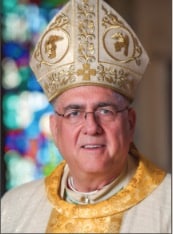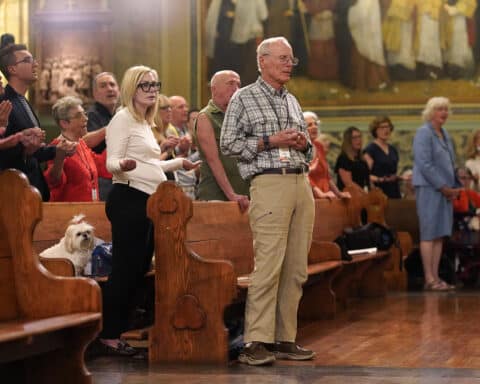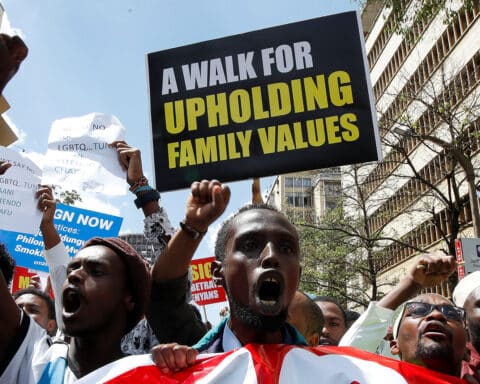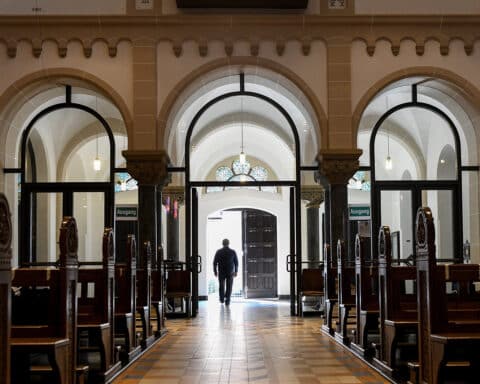Whether it’s for academics or other reasons, many same-sex couples across the country want to enroll their children in Catholic schools.
Some dioceses allow them to enroll the children with the understanding that all students will be taught the Church’s ethics on sexual morality. Some dioceses prohibit it altogether, while others delegate that decision to local parishes and schools.
The issue is a frequent topic in secular media, especially when same-sex couples are turned away. And with the U.S. Supreme Court in 2015 declaring same-sex marriage to be a constitutional right, this is an issue that will not be going away anytime soon.
“I think the Church is always finding herself needing to respond, to find the best ways to respond that respect the human person but that also transmits the goodness and truth of our teachings,” said Mary Pat Donoghue, the executive director of the U.S. Conference of Catholic Bishops’ Secretariat of Catholic Education.
Sensitive, complex issue
While emphasizing that she was not commenting on any specific case, Donoghue told Our Sunday Visitor that the question of whether to allow same-sex couples to enroll children in Catholic schools ultimately is a matter of discernment on the local level.
“There’s always the need to balance the overall mission of the school with the needs of an individual student. That’s true in a number of situations, not just with same-sex parents,” Donoghue said. “But we do expect our parents and student families to recognize and respect the right of the school to teach the tenets of the Faith.”
In a recent statement, the Archdiocese of Kansas City in Kansas said its schools “exist to pass on the Catholic faith.” The statement explained an archdiocesan policy that advises against admitting children of same-sex unions into its Catholic schools.
“We do not feel it is respectful of such individuals, nor is it fair, loving or compassionate to place their children in an educational environment where the values of the parents and the core principles of the school conflict,” the archdiocese said in its statement.
The archdiocese released its statement in early March when local and national media outlets reported the story of a same-sex couple who sought to enroll their child at St. Ann Catholic School in Prairie Village, a suburb of Kansas City.
Father Craig Maxim, the pastor of St. Ann Church, notified parents in a letter dated Feb. 27 that he had sought guidance from the archdiocese.
“I am distressed over the division this sensitive and complex issue has caused within our school and church,” wrote Father Maxim, who added that he would continue to dialogue with the archdiocese and with parishioners who had expressed concerns about the policy.
Diocesan decision
While the Archdiocese of Kansas City prefers not to enroll children of same-sex couples, other dioceses permit their Catholic schools to do so with the understanding that the schools will not compromise their values.
“We can’t really tell parents that they can’t send their child to our school because they’re in a same-sex relationship, but we always must make it clear that our schools will teach children what the Church believes,” said Father Michael Najim, the pastor of St. Pius X Church in Westerly, Rhode Island.
Father Najim told OSV that a same-sex couple not too long ago sent their preschool-age daughter to his parish school. Father Najim said it did not cause any problems for him or the school community.
“I can see how it could cause confusion, but in our case the student was so young that the children wouldn’t have even known,” Father Najim said.
Some dioceses require parents to sign an agreement indicating that they understand and agree that their children will be taught the Church’s teachings in their fullness. In 2015, the Diocese of Springfield in Illinois instituted such an agreement, which includes a provision that parents, legal guardians and students not make a public issue of irregular family situations or promote moral and doctrinal positions contrary to Catholic teaching.
“The wording in the agreement clearly points out that our Catholic schools are open to any family, while maintaining our Catholic identity,” said Andrew Hansen, a spokesman for the Diocese of Springfield.
“No families, to our knowledge, have left our schools because of this agreement, nor has there been any instance where it has prevented a family from sending their child or children to our schools,” Hansen told OSV.
Educating guardians
However, others have concerns about the feasibility of a Catholic school maintaining its identity while enrolling children from same-sex households. Dan Guernsey, the director of K-12 programs at the Cardinal Newman Society, a nonprofit with a mission to “promote and defend faithful Catholic education,” told OSV that in the case of same-sex unions, “perhaps what’s first needed is not a Catholic school for the child, but guidance that leads the child’s guardians to wholeness and holiness, which includes repentance and chastity.
“For a school to be successful in forming children in partnership with parents or guardians, all must have a unified moral vision,” Guernsey said. “If they disagree about fundamental aspects of human flourishing and formation, Catholic education is destined to fail, and the school and guardians should not seek a joint venture.”
Guernsey added that such a situation also may be confusing for the child and their classmates, as well as adults.
“That’s why it’s imperative that the school’s policies and the rationale for those policies are as clear as possible — even as a means of teaching truth to those who don’t understand,” Guernsey said.
Amid a culture change
In the Archdiocese of Kansas City, more than 1,000 people, about a third of them being parishioners of St. Ann Church or with children in the school, signed a petition urging the archdiocese to “prayerfully reconsider” its decision. Catholic school parents elsewhere echoed that sentiment.
“I think loving everyone and educating children is exactly our mission and identity. Welcoming all the children and families is in line with our Gospel calling,” said Jenne O’Neill, a Nebraska resident who has two boys in Catholic elementary school.
O’Neill, who lives in the Diocese of Lincoln, told OSV that she was not aware of any same-sex parents, past or present, who had enrolled their children at her boys’ school. She also said it would not bother her.
“I would hope that the administration would sit down with them and warmly explain Church teaching just so there’s no surprises later,” O’Neill said. “But I would hope they would be welcomed with open arms if that’s what they wanted.”
Donoghue, from the U.S. Conference of Catholic Bishops, said it will be “an ongoing effort” to “honestly, respectfully and frankly” communicate Church teachings to whole school communities, and that ongoing formation is important not just for students, but for families as well.
“As the culture changes, this is going to become more of an issue for us,” Donoghue said.
Brian Fraga is an Our Sunday Visitor contributing editor.
| Relationship Between Schools and Parents |
|---|
 The following is an excerpt from a March 15 column by Archbishop Joseph F. Naumann of the Archdiocese of Kansas City in Kansas, posted by The Leaven, the archdiocesan newspaper: “We try to assist parents in their efforts to help their children become disciples and friends of Jesus. If we do this part of the mission well, then our students will be motivated to do their very best — not for human honor and praise, but to glorify God who has given them life and entrusted them with their talents and gifts. “An important part of this spiritual formation is helping our students develop the virtues necessary to live a moral life. Part of this virtue formation includes cultivating chastity, helping our students understand the meaning and purpose of their sexuality. Our students are also taught the nature of marriage as a call to heroic, faithful, fruitful and forever love which serves as the foundation of the family. … In the very beginning of the Bible, we find the foundational principles for Christian marriage: 1) between one man and one woman; 2) permanent, never to be divided; and 3) fruitful — open to being co-creators with God of new human life. When Jesus in the Gospel is asked a question about the permissibility of divorce, he cites Genesis to describe God’s intention for marriage. … “Children learn from excellent classroom instruction, reading the best literature and the wealth of information provided through modern technology. However, the most powerful influence upon a child’s moral formation is the witness and the examples of the significant adults in their lives. Parents are the first teachers of their children, especially as regards faith and virtue. Our schools enter into a partnership with parents. We require our parents to commit to the best of their ability to model in their home life the moral formation their children receive in our Catholic schools.” |





